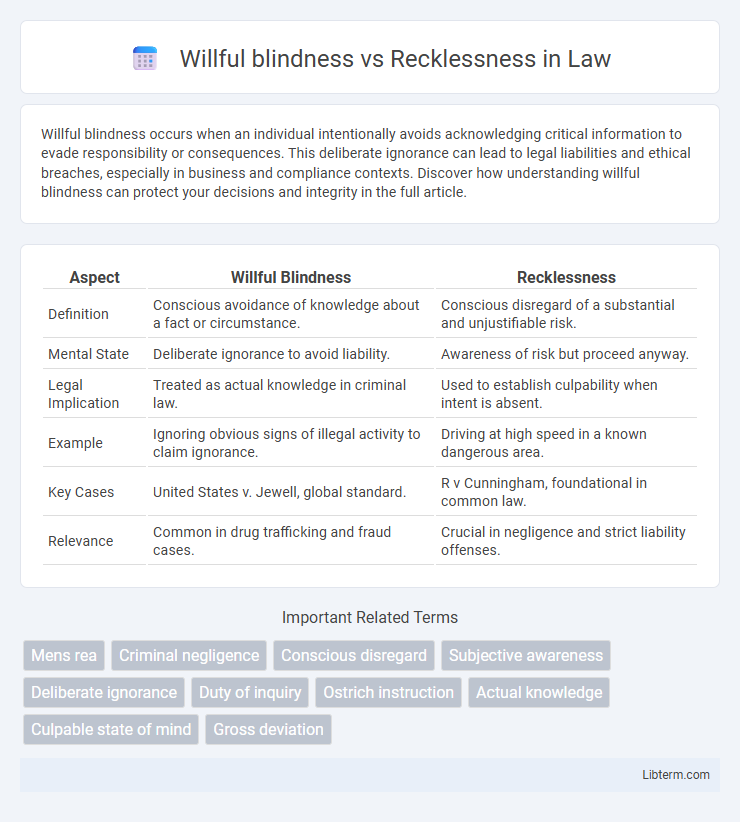Willful blindness occurs when an individual intentionally avoids acknowledging critical information to evade responsibility or consequences. This deliberate ignorance can lead to legal liabilities and ethical breaches, especially in business and compliance contexts. Discover how understanding willful blindness can protect your decisions and integrity in the full article.
Table of Comparison
| Aspect | Willful Blindness | Recklessness |
|---|---|---|
| Definition | Conscious avoidance of knowledge about a fact or circumstance. | Conscious disregard of a substantial and unjustifiable risk. |
| Mental State | Deliberate ignorance to avoid liability. | Awareness of risk but proceed anyway. |
| Legal Implication | Treated as actual knowledge in criminal law. | Used to establish culpability when intent is absent. |
| Example | Ignoring obvious signs of illegal activity to claim ignorance. | Driving at high speed in a known dangerous area. |
| Key Cases | United States v. Jewell, global standard. | R v Cunningham, foundational in common law. |
| Relevance | Common in drug trafficking and fraud cases. | Crucial in negligence and strict liability offenses. |
Understanding Willful Blindness: Definition and Key Traits
Willful blindness involves consciously avoiding knowledge of certain facts to evade responsibility, characterized by deliberate ignorance and intentional avoidance of the truth. Key traits include a purposeful effort to remain unaware and a disregard for obvious evidence that would reveal critical information. This contrasts with recklessness, where there is a known risk but no intent to avoid knowledge, emphasizing the mental state behind the ignorance.
What Constitutes Recklessness in Legal and Ethical Contexts
Recklessness in legal and ethical contexts involves conscious disregard of substantial and unjustifiable risks that a reasonable person would avoid, demonstrating a blatant indifference to potential harm. This state of mind contrasts with willful blindness, where an individual intentionally avoids acquiring knowledge of wrongdoing to escape liability. Courts often examine factors such as knowledge of risk, degree of deviation from standard conduct, and foreseeability of harm to determine recklessness in cases of criminal negligence, torts, and corporate governance.
Willful Blindness vs Recklessness: Core Differences
Willful blindness involves consciously avoiding awareness of facts to evade liability, whereas recklessness entails knowingly disregarding a substantial risk. The core difference lies in intent: willful blindness requires deliberate ignorance, while recklessness is characterized by conscious disregard of potential harm. Legal standards often treat willful blindness as equivalent to actual knowledge, impacting culpability and sentencing.
Psychological Mechanisms Behind Willful Blindness
Willful blindness involves consciously avoiding knowledge of a wrongdoing, driven by psychological mechanisms such as cognitive dissonance and motivated reasoning, which enable individuals to ignore or deny inconvenient truths to reduce mental discomfort. This contrasts with recklessness, where a person consciously disregards a known risk without intent to avoid awareness. Understanding these mechanisms highlights how willful blindness functions as a self-imposed barrier to acknowledging facts, influencing legal and ethical accountability.
Motivations and Risk Factors for Reckless Behavior
Reckless behavior is primarily driven by a desire for thrill, social approval, or escape from stress, often accompanied by a low perception of risk. Motivations include impulsivity, peer pressure, and a tendency to underestimate consequences, which differentiate it from willful blindness where individuals consciously avoid knowledge. Risk factors for reckless behavior involve psychological traits such as sensation-seeking, lack of self-control, and environmental influences like unsupervised settings or exposure to risky role models.
Real-World Examples: Willful Blindness in Action
Willful blindness occurs when individuals intentionally avoid acquiring knowledge of illegal or unethical activities, such as a corporate executive ignoring signs of financial fraud within their company. Recklessness involves conscious disregard of a substantial risk, exemplified by a factory manager knowingly neglecting safety protocols, leading to worker injuries. Real-world cases like Enron's collapse highlight willful blindness, where executives ignored warning signs to maintain profits, demonstrating deliberate ignorance rather than mere negligence.
High-Profile Cases Highlighting Recklessness
High-profile cases highlighting recklessness often involve defendants who consciously disregard substantial risks, such as the Volkswagen emissions scandal where executives ignored test manipulation warnings. Willful blindness differs as it entails deliberately avoiding knowledge to escape liability, seen in certain insider trading cases where individuals ignore obvious red flags. Courts scrutinize recklessness more severely in scenarios where the accused consciously take unjustifiable risks, leading to significant harm or fraud.
Legal Implications: Willful Blindness vs Recklessness
Willful blindness involves deliberately avoiding knowledge of illegal activities, often treated legally as equivalent to actual knowledge, leading to strict liability in criminal cases. Recklessness entails consciously disregarding a substantial risk, with courts assessing the defendant's awareness and indifference to potential harm, influencing the degree of culpability. Legal implications distinguish willful blindness as intentional avoidance, while recklessness centers on conscious risk disregard, affecting convictions and sentencing severity.
Preventing Willful Blindness and Reckless Conduct in Organizations
Preventing willful blindness and reckless conduct in organizations requires establishing robust internal controls, comprehensive employee training, and clear ethical guidelines to foster accountability and transparency. Implementing whistleblower policies and regular audits can detect and deter intentional ignorance or reckless behavior, reducing legal liabilities and reputational risks. Leadership commitment to a culture of compliance and proactive risk management is critical in mitigating these harmful practices.
Conclusion: Addressing Willful Blindness and Recklessness in Society
Addressing willful blindness and recklessness in society requires clear legal definitions and enforcement that differentiate intentional ignorance from negligent behavior. Promoting education and awareness can reduce instances of willful blindness by encouraging accountability and ethical decision-making. Strengthening regulatory frameworks ensures that both mental states are appropriately penalized to deter harm and uphold justice.
Willful blindness Infographic

 libterm.com
libterm.com